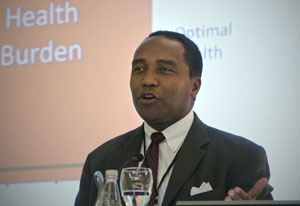NIH participates in 2010 international diabetes summit
August 2010 | Volume 9, Issue 4

Photo courtesy of the World Diabetes Foundation
The science of behavior change is critical to addressing
chronic diseases, Dr. Griffin Rogers stressed during his
keynote address to a recent gathering of Latin American
researchers. Rogers is director of the National Institute of
Diabetes and Digestive and Kidney Disorders at the NIH.
NIH leaders participated in the recent Diabetes Summit for Latin America, emphasizing the importance of the science of behavior change and the necessity to build the human capacity required to carry out such research.
More than 250 stakeholders from around the region gathered in Brazil to share ideas about how best to confront the epidemic of diabetes and other chronic diseases.
Heart disease, cancer, diabetes and other chronic diseases are the leading causes of premature death and illness throughout the Americas, according to the WHO. They account for some 4.5 million deaths each year in Latin America and the Caribbean, or 77 percent of all deaths in the region.
Many of these deaths are preventable, the NIH’s Dr. Griffin Rodgers told the group during his keynote address. Rogers - director of the National Institute of Diabetes and Digestive and Kidney Diseases (NIDDK) - highlighted several NIH-supported trials that have shown lifestyle changes involving diet and exercise are more successful in preventing and controlling diabetes than drug treatment. Rodgers stressed the need for research regarding behavior change to address chronic diseases.

Photo by David Rochkind
Clinical trials have demonstrated that
diet and exercise have a greater effect
than drugs on diabetes prevention and
control.
But the challenges posed by the epidemic must be solved with local expertise, said Fogarty director Dr. Roger Glass. "Through its training programs for developing country scientists, Fogarty is creating a body of researchers whose intimate knowledge of the local context makes them uniquely poised to make advances in this critical research."
In addition, Glass and Rodgers led a panel discussion on harnessing science and using public outreach to combat noncommunicable diseases.
Among other key issues discussed during the summit were the need to adjust health systems to address chronic illnesses, the importance of strengthening implementation of the tobacco framework, and the need to bolster surveillance systems to track and monitor chronic diseases.
The summit was hosted by the World Diabetes Foundation, with co-sponsorship by the Pan American Health Organization and the Ministry of Health of Brazil.
More Information
To view Adobe PDF files,
download current, free accessible plug-ins from Adobe's website.